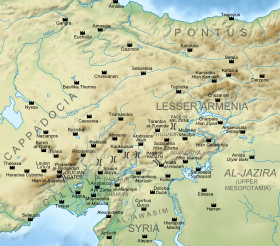Battle of Marash (953)
| Battle of Marash | |||||||
|---|---|---|---|---|---|---|---|
| Part of the Arab–Byzantine Wars | |||||||
 Map of the Arab-Byzantine frontier zone |
|||||||
|
|||||||
| Belligerents | |||||||
| Byzantine Empire | Hamdanid Emirate of Aleppo | ||||||
| Commanders and leaders | |||||||
| Bardas Phokas the Elder (WIA) | Sayf al-Dawla | ||||||
| Strength | |||||||
| Unknown, but considerably larger than the Hamdanid force | 600 cavalry | ||||||
The Battle of Marash was fought in 953 near Marash (modern Kahramanmaraş) between the forces of the Byzantine Empire under the Domestic of the Schools Bardas Phokas the Elder, and of the Hamdanid Emir of Aleppo, Sayf al-Dawla, the Byzantines' most intrepid enemy during the mid-10th century. Despite being outnumbered, the Arabs defeated the Byzantines who broke and fled. Bardas Phokas himself barely escaped through the intervention of his attendants, and suffered a serious wound in his face, while his youngest son and governor of Seleucia, Constantine Phokas, was captured and held a prisoner in Aleppo until his death of an illness some time later. This debacle, coupled with defeats in 954 and again in 955, led to Bardas Phokas' dismissal as Domestic of the Schools, and his replacement by his eldest son, Nikephoros Phokas (later emperor in 963–969).
In the period from 945 to 967, the Hamdanid Emir of Aleppo, Sayf al-Dawla, was the Byzantines' most persistent opponent on their eastern frontier, by virtue of his control over most of the Byzantine–Muslim borderlands (Thughur) and his commitment to jihad. After his establishment of a large domain centred on Aleppo in 945, the Hamdanid prince began confronting the Byzantines on an annual basis. Despite the numerical advantage enjoyed by the Byzantines, the Hamdanid's emergence blunted a Byzantine offensive that had been unfolding since the mid-920s and had already resulted in the fall of Malatya (934), Arsamosata (940), and Qaliqala (in 949).
Sayf al-Dawla's main opponent during the first decade of continuous conflict with the Byzantines was the Domestic of the Schools (commander-in-chief) Bardas Phokas, who had been appointed to the post in 945. Phokas was the personal choice of Emperor Constantine VII, who needed a reliable ally in this critical post. An experienced soldier, Phokas was by now well into his sixties, and not up to the task entrusted to him: even sources favourably disposed to the Phokades commented on Bardas that although a good general under someone else's command, he was unable to adequately fulfil the role of commander-in-chief. Sayf al-Dawla, on the other hand, has come down to us—mainly through the work of his court poets—as the archetype of Arab chivalry and a great warrior, but he was greatly hampered by lack of men and money, by rebellions in his domains and by lack of support from the rest of the Muslim world.
...
Wikipedia
